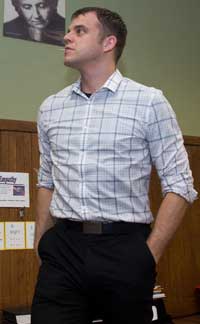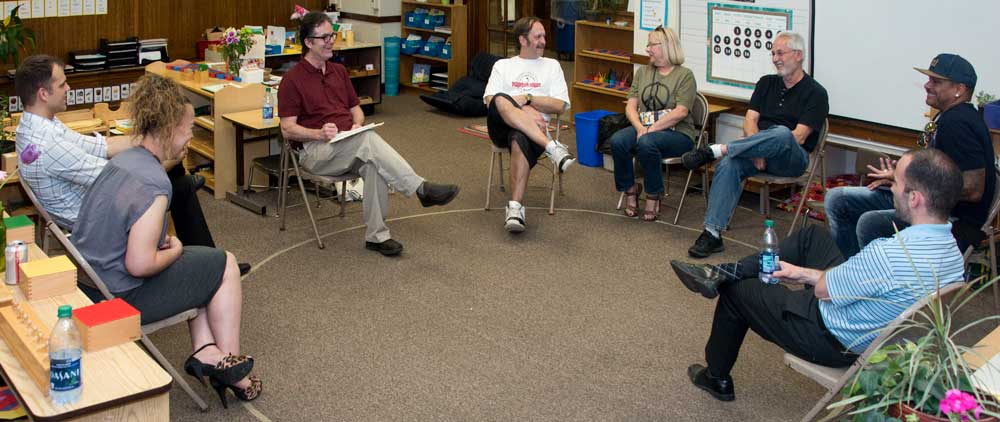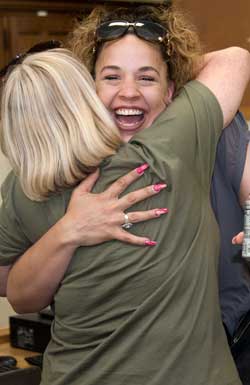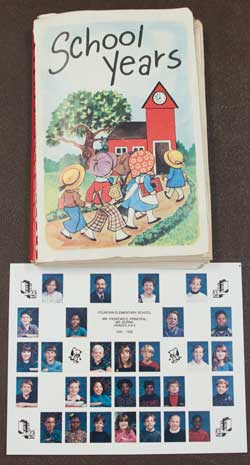Editor’s note: As a reporter for The Grand Rapids Press, Charles Honey began writing about a group of kindergartners at Fountain School in the fall of 1987, in a series called the Class of 2000. Honey continued following them through the grades at Fountain, with some class members changing each year. Beginning in middle school, The Press tracked the progress of those original 33 kindergartners as they scattered to different schools and states. Press writers Jaye Beeler, Juanita Westaby and Lisa Ann Williamson joined the coverage through middle and high school, concluding with a reunion of class members at graduation time in June of 2000.
Related story: After learning first lessons at Fountain, she works on behalf of all students
The moment Rae Bunce saw Aissa Jackson walk in, her face lit up and she gave her a big hug.
“Oh, you look beautiful!” exclaimed “Miss Rae,” secretary at Fountain School when Jackson was an elementary student there. “Oh honey! What a joy!”
Their embrace summed up the joy that a small group of former Fountain students and staffers felt at an informal reunion in mid-May. They were alumni of the Class of 2000, a group of students I began following as kindergartners in the fall of 1987 in a series of stories for The Grand Rapids Press.

Now here they were back at Fountain, at an informal get-together to which I had invited those who live in the area. It’s now Grand Rapids Montessori, part of Grand Rapids Public Schools’ highly touted Montessori program. But to the students and staff who gathered that late afternoon in their old kindergarten classroom, it felt like returning home.
They are now seasoned workers and parents in their mid-30s. But back in the cozy kindergarten where they learned their ABC’s from teacher Mary Schneider, their memories of early childhood came flooding back.
“Right in front of me was the count to 100 poster,” Jackson recalled warmly, sitting across from her Fountain principal, Mike Paskewicz.
“There was show and tell, right?” said David Jackiewicz, who also remembered athletic outings at Houseman Field. “We’d walk down there and they’d give everybody awards.”
Carl Harwood and Jason Byer traded mirthful memories of their “awesome” third-grade teacher, the late Phil Maines, who Byer said taught them to listen by saying when you open your mouth, it shuts off your ears. Laughter circled the room where they’d once giggled while learning to spell.
“We were just kids and we were just happy to be there to play with each other.” — former Fountain School student Sarah Abraham
It was also the place where they learned educators cared about them and wanted the best for them, even when they were in the principal’s office. It was a place of community and a kind of family.
“I felt so successful,” said Jackson, now a substitute teacher at Congress School. “I felt so celebrated academically. It gave me a lot of confidence in anything. I grew up like, ‘Hey, I’m really smart.’ Just having that confidence … that went a long way.”

Starting Together, Going Everywhere
Class of 2000 students have gone a long way in their lives since I first met them as little 4- and 5-year-olds. Some have gone on study tours in France and Peru; some live in far-flung states, from California to Tennessee to Massachusetts; a few have weathered life’s challenges including addiction and prison. They’ve worked as engineers, historians, artists, business people, and as mothers and fathers.
In other words, they’re a microcosm of America – a group of people who started their school careers together at a small school in Heritage Hill, the children of professors, trades people and low-income single parents finding common ground in a little world of picture books and times tables.
“They wanted you to be successful and they loved you … It was just a place that was good.” — former Fountain School student Loren Moulds
Following their lives and watching them grow into young adults was the most gratifying story of my journalism career. It was also a foundational experience for Paskewicz, Fountain’s principal through the Class of 2000’s elementary years, who went on to a distinguished career in administration, including as superintendent of Northview Public Schools until his retirement in 2015. It was “where I found my voice for the value of public education,” he told me in a story at his retirement.
Paskewicz told his former students how much he learned from them and their families who had to overcome daunting struggles. He spoke of Jason Byer’s mother, who was a lunch lady there, making sure kids got enough to eat. “That was such an incredible gift,” he told Byer.
“What you guys taught me is … always you reminded me it was about you, not about the adults,” Paskewicz said. “I’ve carried that for my entire career.”

Valuing Public Schools
The intervening years have given class members perspective on how valuable their experience was at Fountain. Loren Moulds and Sarah (Sorensen) Abraham, with whom I met separately, are both parents of school-age children. If their kids receive the same kind of nurturing that they did at Fountain, they would consider them blessed.
“It was like a family,” said Sarah Abraham, a SpartanNash product development manager whose son, Alexander, goes to Caledonia Elementary. “It was a small community school where everybody was the same.”
She remembers no distinctions of race or class: “We were just kids and we were just happy to be there to play with each other.”
Loren Moulds remembers always being happy at Fountain, along with little caring things, like Paskewicz buying him pizza one day when he forgot lunch.
“They wanted you to be successful and they loved you,” said Moulds, a City High graduate and now a digital collections librarian at the University of Virginia Law School Library. “It was just a place that was good.”
Both are keenly aware of the advantages they had, with parents who sought out opportunities for them such as the Spectrum gifted and talented program. Both went to (John Ball) Zoo School, and Moulds took a subsequent ecology tour of Peru led by beloved Zoo instructor Dennis Kretschman, who died early this year. Public schools should get the resources they need so all students can enjoy the education they did, they say.
“To be educated citizens, it’s the most critical thing we can do as a society, and we are failing,” said Moulds, whose wife, Kelly, is a middle school teacher.

Carrying on Lessons Learned
Back at the Fountain School gathering, class members smiled as they pored over old Grand Rapids Press clippings about them. “That’s my best friend back then, Mike Fish,” said Derek Rostic, pointing to a picture of the lad.
In the kindergarten room chat, Aissa Jackson said she aimed to apply the kind of teaching and sense of community at Congress School that she received at Fountain. She plans to pursue a career in public education, encouraging diverse students in their gifts as she was encouraged.
“The importance of public school, that was what I got here,” said Jackson, who earned a business degree at Ferris State University. “It was the first time I experienced a lot of community, like a family type of feeling.”
David Jackiewicz said the diversity he experienced at Fountain served him well, as did the personal interest Paskewicz and teachers took in their students’ welfare.

“You get that start, it makes you feel equal in the world, not better than or less than,” said Jackiewicz, a marketing manager at Granger Group and adjunct instructor at Kellogg Community College. “That’s the type of start Fountain gave me, as a result of how you guys treated us.”
Jason Byer brings what he learned at Fountain to his two children’s school, Central Elementary in Kenowa Hills, where he is a volunteer dad. He remembers all his teachers’ names, as well as Carl Harwood being his best friend in kindergarten.
“It was a good environment,” said Byer, a quality manager at Lacks Enterprises. “Even if we did something wrong, we could still come talk to you guys” – and receive more sympathy than punishment.
Carl Harwood, a driver for Roth Trucking, chuckled about playing on the tire swing and admitted to spending a lot of time in Paskewicz’s office for bad behavior. “I thought we were co-workers,” he cracked to his former principal. Still, he said, “You were my favorite principal, by far.”
Paskewicz praised him for his perseverance through personal difficulties, including his family being evicted from their apartment, and “how much learning you have taken from a tough situation that many people would have collapsed in, and you didn’t.”
Former teacher Mark Dykstra said some of his students still keep in touch with him, and that of the five schools he taught in, “This was the best ever.”
“Miss Rae,” the secretary, remains friends with many former students. “Our hearts never left here,” she said.
“We just love Fountain kids,” she told the former kids. “We were a family. Maybe we still are.”


















